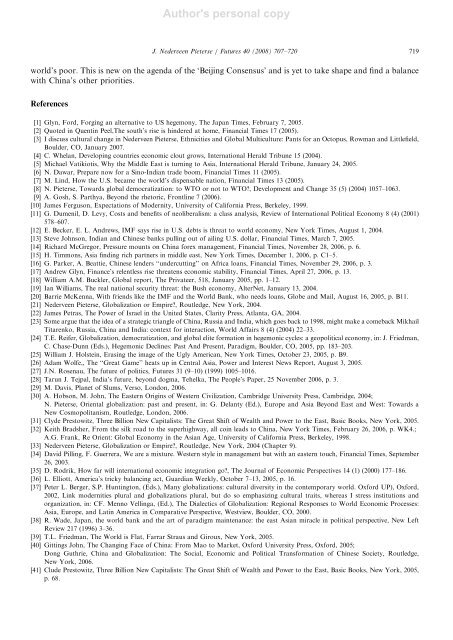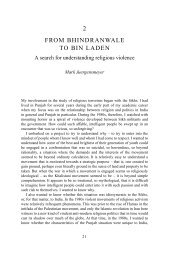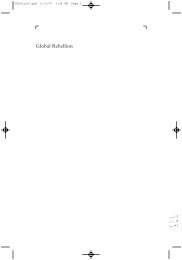New Glob Fu JFTR1275.pdf - Jan Nederveen Pieterse
New Glob Fu JFTR1275.pdf - Jan Nederveen Pieterse
New Glob Fu JFTR1275.pdf - Jan Nederveen Pieterse
You also want an ePaper? Increase the reach of your titles
YUMPU automatically turns print PDFs into web optimized ePapers that Google loves.
Author's personal copy<br />
ARTICLE IN PRESS<br />
J. <strong>Nederveen</strong> <strong>Pieterse</strong> / <strong>Fu</strong>tures 40 (2008) 707–720 719<br />
world’s poor. This is new on the agenda of the ‘Beijing Consensus’ and is yet to take shape and find a balance<br />
with China’s other priorities.<br />
References<br />
[1] Glyn, Ford, Forging an alternative to US hegemony, The Japan Times, February 7, 2005.<br />
[2] Quoted in Quentin Peel,The south’s rise is hindered at home, Financial Times 17 (2005).<br />
[3] I discuss cultural change in <strong>Nederveen</strong> <strong>Pieterse</strong>, Ethnicities and <strong>Glob</strong>al Multiculture: Pants for an Octopus, Rowman and Littlefield,<br />
Boulder, CO, <strong>Jan</strong>uary 2007.<br />
[4] C. Whelan, Developing countries economic clout grows, International Herald Tribune 15 (2004).<br />
[5] Michael Vatikiotis, Why the Middle East is turning to Asia, International Herald Tribune, <strong>Jan</strong>uary 24, 2005.<br />
[6] N. Dawar, Prepare now for a Sino-Indian trade boom, Financial Times 11 (2005).<br />
[7] M. Lind, How the U.S. became the world’s dispensable nation, Financial Times 13 (2005).<br />
[8] N. <strong>Pieterse</strong>, Towards global democratization: to WTO or not to WTO?, Development and Change 35 (5) (2004) 1057–1063.<br />
[9] A. Gosh, S. Parthya, Beyond the rhetoric, Frontline 7 (2006).<br />
[10] James Ferguson, Expectations of Modernity, University of California Press, Berkeley, 1999.<br />
[11] G. Dumenil, D. Levy, Costs and benefits of neoliberalism: a class analysis, Review of International Political Economy 8 (4) (2001)<br />
578–607.<br />
[12] E. Becker, E. L. Andrews, IMF says rise in U.S. debts is threat to world economy, <strong>New</strong> York Times, August 1, 2004.<br />
[13] Steve Johnson, Indian and Chinese banks pulling out of ailing U.S. dollar, Financial Times, March 7, 2005.<br />
[14] Richard McGregor, Pressure mounts on China forex management, Financial Times, November 28, 2006, p. 6.<br />
[15] H. Timmons, Asia finding rich partners in middle east, <strong>New</strong> York Times, December 1, 2006, p. C1–5.<br />
[16] G. Parker, A. Beattie, Chinese lenders ‘‘undercutting’’ on Africa loans, Financial Times, November 29, 2006, p. 3.<br />
[17] Andrew Glyn, Finance’s relentless rise threatens economic stability, Financial Times, April 27, 2006, p. 13.<br />
[18] William A.M. Buckler, <strong>Glob</strong>al report, The Privateer, 518, <strong>Jan</strong>uary 2005, pp. 1–12.<br />
[19] Ian Williams, The real national security threat: the Bush economy, AlterNet, <strong>Jan</strong>uary 13, 2004.<br />
[20] Barrie McKenna, With friends like the IMF and the World Bank, who needs loans, <strong>Glob</strong>e and Mail, August 16, 2005, p. B11.<br />
[21] <strong>Nederveen</strong> <strong>Pieterse</strong>, <strong>Glob</strong>alization or Empire?, Routledge, <strong>New</strong> York, 2004.<br />
[22] James Petras, The Power of Israel in the United States, Clarity Press, Atlanta, GA, 2004.<br />
[23] Some argue that the idea of a strategic triangle of China, Russia and India, which goes back to 1998, might make a comeback Mikhail<br />
Titarenko, Russia, China and India: context for interaction, World Affairs 8 (4) (2004) 22–33.<br />
[24] T.E. Reifer, <strong>Glob</strong>alization, democratization, and global elite formation in hegemonic cycles: a geopolitical economy, in: J. Friedman,<br />
C. Chase-Dunn (Eds.), Hegemonic Declines: Past And Present, Paradigm, Boulder, CO, 2005, pp. 183–203.<br />
[25] William J. Holstein, Erasing the image of the Ugly American, <strong>New</strong> York Times, October 23, 2005, p. B9.<br />
[26] Adam Wolfe,, The ‘‘Great Game’’ heats up in Central Asia, Power and Interest <strong>New</strong>s Report, August 3, 2005.<br />
[27] J.N. Rosenau, The future of politics, <strong>Fu</strong>tures 31 (9–10) (1999) 1005–1016.<br />
[28] Tarun J. Tejpal, India’s future, beyond dogma, Tehelka, The People’s Paper, 25 November 2006, p. 3.<br />
[29] M. Davis, Planet of Slums, Verso, London, 2006.<br />
[30] A. Hobson, M. John, The Eastern Origins of Western Civilization, Cambridge University Press, Cambridge, 2004;<br />
N. <strong>Pieterse</strong>, Oriental globalization: past and present, in: G. Delanty (Ed.), Europe and Asia Beyond East and West: Towards a<br />
<strong>New</strong> Cosmopolitanism, Routledge, London, 2006.<br />
[31] Clyde Prestowitz, Three Billion <strong>New</strong> Capitalists: The Great Shift of Wealth and Power to the East, Basic Books, <strong>New</strong> York, 2005.<br />
[32] Keith Bradsher, From the silk road to the superhighway, all coin leads to China, <strong>New</strong> York Times, February 26, 2006, p. WK4.;<br />
A.G. Frank, Re Orient: <strong>Glob</strong>al Economy in the Asian Age, University of California Press, Berkeley, 1998.<br />
[33] <strong>Nederveen</strong> <strong>Pieterse</strong>, <strong>Glob</strong>alization or Empire?, Routledge, <strong>New</strong> York, 2004 (Chapter 9).<br />
[34] David Pilling, F. Guerrera, We are a mixture. Western style in management but with an eastern touch, Financial Times, September<br />
26, 2003.<br />
[35] D. Rodrik, How far will international economic integration go?, The Journal of Economic Perspectives 14 (1) (2000) 177–186.<br />
[36] L. Elliott, America’s tricky balancing act, Guardian Weekly, October 7–13, 2005, p. 16.<br />
[37] Peter L. Berger, S.P. Huntington, (Eds.), Many globalizations: cultural diversity in the contemporary world. Oxford UP), Oxford,<br />
2002, Link modernities plural and globalizations plural, but do so emphasizing cultural traits, whereas I stress institutions and<br />
organization, in: CF. Menno Vellinga, (Ed.), The Dialectics of <strong>Glob</strong>alization: Regional Responses to World Economic Processes:<br />
Asia, Europe, and Latin America in Comparative Perspective, Westview, Boulder, CO, 2000.<br />
[38] R. Wade, Japan, the world bank and the art of paradigm maintenance: the east Asian miracle in political perspective, <strong>New</strong> Left<br />
Review 217 (1996) 3–36.<br />
[39] T.L. Friedman, The World is Flat, Farrar Straus and Giroux, <strong>New</strong> York, 2005.<br />
[40] Gittings John, The Changing Face of China: From Mao to Market, Oxford University Press, Oxford, 2005;<br />
Dong Guthrie, China and <strong>Glob</strong>alization: The Social, Economic and Political Transformation of Chinese Society, Routledge,<br />
<strong>New</strong> York, 2006.<br />
[41] Clude Prestowitz, Three Billion <strong>New</strong> Capitalists: The Great Shift of Wealth and Power to the East, Basic Books, <strong>New</strong> York, 2005,<br />
p. 68.





